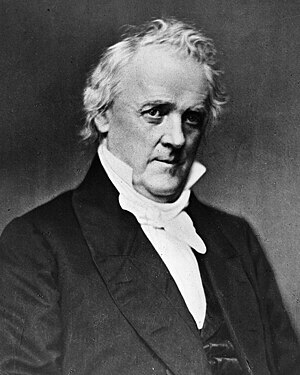“The ballot box is the surest arbiter of disputes among free men.”
To accomplish this object an extensive military organization was
formed, and its command intrusted to the most violent revolutionary
leaders. Under these circumstances it became my imperative duty to exert
the whole constitutional power of the Executive to prevent the flames of
civil war from again raging in Kansas, which in the excited state of the
public mind, both North and South, might have extended into the neighboring
States. The hostile parties in Kansas had been inflamed against each other
by emissaries both from the North and the South to a degree of malignity
without parallel in our history. To prevent actual collision and to assist
the civil magistrates in enforcing the laws, a strong detachment of the
Army was stationed in the Territory, ready to aid the marshal and his
deputies when lawfully called upon as a posse comitatus in the execution of
civil and criminal process. Still, the troubles in Kansas could not have
been permanently settled without an election by the people.
The ballot box is the surest arbiter of disputes among freemen. Under this
conviction every proper effort was employed to induce the hostile parties
to vote at the election of delegates to frame a State constitution, and
afterwards at the election to decide whether Kansas should be a slave or
free State.
The insurgent party refused to vote at either, lest this might be
considered a recognition on their part of the Territorial government
established by Congress. A better spirit, however, seemed soon after to
prevail, and the two parties met face to face at the third election, held
on the first Monday of January, 1858, for members of the legislature and
State officers under the Lecompton constitution. The result was the triumph
of the antislavery party at the polls. This decision of the ballot box
proved clearly that this party were in the majority, and removed the danger
of civil war. From that time we have heard little or nothing of the Topeka
government, and all serious danger of revolutionary troubles in Kansas was
then at an end.
Subsequent developments proved
that it was not fear of a British victory, but sympathy with British
plans, which prompted this view. Several other officers, however,
Washington himself, Gen. Anthony Wayne, who was always ready to fight,
General Greene, General Cadwallader, and Lafayette, were in favor
of following and attacking at the earliest opportunity. It was this
course that Washington chose, in spite of the majority of votes against
it. It seemed to him that the difficulty Clinton must experience in
maneuvering his army over the roads of that region, and the fact that
almost half of his force would need to be employed in guarding the
unwieldy baggage-train, justified the expectation of success. His plan
was to throw out a strong detachment ahead of the main army to harass
the British flanks and rear and to follow this up so closely that the
main army would be ready to go to its support in case Clinton turned to
fight.
The command of the advanced detachment was the post of honor, and to
this Lee was entitled because of his rank. He refused it and Washington
offered it to Lafayette, who accepted joyously. He had already begun
his march when Lee reconsidered and sent Washington word that he
desired the command, after all, appealing at the same time to Lafayette
with the words, "I place my fortune and my honor in your hands; you
are too generous to destroy both the one and the other." Lee was
[Pg 110]one of the few men Lafayette did not like, though he had no
suspicion of his loyalty. He thought him ugly in face and in spirit,
full of avarice and ambition. But Lee was his superior officer, and
Lafayette was a soldier as well as a gentleman. He relinquished the
command at once and offered to serve under Lee as a volunteer.
It would have been better had he found it in his heart and in the
military regulations to refuse, for on that sultry unhappy 28th of
June when the two armies met and the battle of Monmouth Court House
was fought, General Lee's indecision and confusion of orders, to give
his conduct no harsher name, turned the advance of the Americans,
who were in the best of spirits and eager to fight, into what their
generals admitted was "a disgraceful rout.
